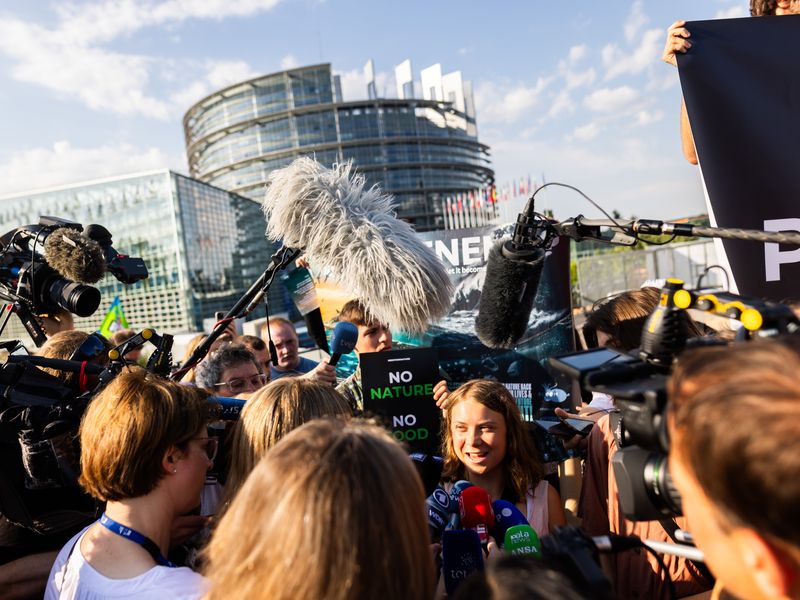 Have the article read by OpenAI (Beta). Please note that AI translations may take some time to process.
Have the article read by OpenAI (Beta). Please note that AI translations may take some time to process.In June 2022, European Commission President Ursula von der Leyen proposed the nature restoration bill which is part of the Green Deal. The proposal to rehabilitate at least 20 percent of Europe’s degraded ecosystems by 2030 is seen as a central pillar of the EU’s biodiversity strategy.
The law, which had previously been rejected by the parliament’s committees, aims to resuscitate degraded ecosystems by boosting forested areas and marine habitats and increasing connectivity between rivers. It is part of the long-term recovery strategy for damaged nature across the EU’s territory as more than 80 percent of European habitats are in poor condition. It is also intended to make the EU more resilient in the face of global warming – but it has proved divisive.
Opposition came in particular from the European People’s Party (EPP), von der Leyen’s own parliamentary grouping.
On Wednesday, the controversial proposal survived the vote in the European Parliament with 336 in favour, 300 against and 13 abstentions.
🌳🐝EU Nature Restoration Law
— EP PressService (@EuroParlPress) July 12, 2023
Parliament adopts its position for negotiations with @EUCouncil
Press release to come shortly pic.twitter.com/e8u6bRf9wf
‘European Trumpism’ or sincere worry about food security?
The nature restoration law triggered intense controversy leading up to the vote. Had it been rejected, the EU’s climate neutrality targets may have been in jeopardy.
The bill has become a potent campaign issue ahead of European elections in June 2024 with left wing and centrist lawmakers accusing the EPP of using the bill as a political football.
“What we are seeing now… I would call ‘European Trumpism,'” said French MEP Pascal Canfin, member of the liberal Renew grouping and chair of the parliament’s environment committee, referring to former US president Donald Trump’s go-it-alone governing style and policies rolling back environmental protection.
Before the vote, Dutch MEP Mohammed Chahim from the centre-left Socialists and Democrats grouping (S&D) said that “apparently, the elections have started, and it’s all at the expense of nature.”
The parliament’s biggest political grouping, the conservative European People’s Party (EPP), which woos Europe’s farmers as a key constituency, had sought to shoot down the text, arguing that it would reduce EU food security, hurt farmers and fishermen, and limit possibilities to build wind and hydroelectric energy facilities.

By rejecting the bill, German EPP leader Manfred Weber strengthened the axis with the right-wing parties. Ahead of the vote, a lead EPP lawmaker on the issue, German MEP Peter Liese, said the commission’s draft law was “such a bad proposal” that rejecting it was “the only alternative.” The German MEP stressed that the EPP had backed “many, many other” Green Deal laws but “we are already on the edge of doing too much.”
The law also divided Croatian left-wing and right-wing MEPs, who had opposing interpretations of the impact of the law on the country’s fishermen. Tomislav Sokol (EPP) noted that if fishing and trawling were limited with excessively strict measures, it would no longer be possible to buy local but imported fish. Fred Matić (S&D), on the other hand, stressed that this regulation would prevent foreign fish from being served in Croatia.
EU legislators from socialist, green and left-wing groups in the parliament supported the legislation, with many joining Swedish climate activist Greta Thunberg in a demonstration backing it on Tuesday. “Our message to the politicians is to choose nature, to choose people, over profit and greed,” she said at the protest in Strasbourg.
Simultaneously, farmers driving their tractors responded to a call by the European farmers’ association Copa-Cogeca and demonstrated against the nature conservation law in front of the parliament building.
A split in the Ursula majority, unprecedented unity between others
The approval of the text confirmed the split in von der Leyen’s majority.
“The obstruction by the right, the extreme-right and some of the liberals has led to a largely watered-down version being adopted.”, said Belgian MEP Caroline Roose (Greens). Seas At Risk, a non-governmental organisation lobbying for maritime environmental protections agreed, criticising what it called “populist grandstanding” by right-wing and far-right lawmakers, and the “significantly weakened” final position.
While there has been criticism, it has been striking to see the unprecedented unity between S&D with Left, Greens and part of Renew, in the corridors of Strasbourg. It is premature to speak of an alternative majority to the one Weber has in mind. But an earthquake has happened with the break-up of the EPP-S&D axis that supported Commission President von der Leyen. She has chosen not to comment on the vote thus far but her moral suasion in favour of the Green Deal, von der Leyen legislature’s priority, is very likely. The vote is ‘a political result for the commission’, remarked Paolo Gentiloni, Commissioner for Economy.
French MEP Manon Aubry, the co-chair of the Left, said that the vote marked the defeat of an attempt to transfer the right/centre-right alliance backing Meloni’s government in Italy to the EU level.
“We are relieved,” Aubry said. “It is a great defeat for the coalition between the People’s Party and the Right, a coalition that you know well in Italy with the Meloni government. They tried it in Italy and now they wanted to try in the European Parliament, but we defeated them. It is proof that, together, the parties of the left can save the environmental agenda and defeat the right.”
In the midst of the campaign for the Spanish general election on 23 July, the vote pitted Spain’s two main political parties in the European Parliament against each other: the Socialist Party, which voted in favour, and the Popular Party, which voted against.
Although the text ended up going through by a narrow margin, the leader of the Social Democrats in the European Parliament, Spain’s Iratxe García, accused the Spanish Popular Party of “joining the climate change deniers” as it had sided with the conservative and far-right groups.

Nature restoration law now awaits test of trilogues
After Wednesday’s vote, the European Parliament will start negotiations with the Council of the European Union on the final shape of the legislation.
The Council, the co-legislator, adopted its negotiating position last week, according to which member states must restore at least 30 percent of the total area of habitats in terrestrial, coastal, freshwater and marine ecosystems that are not in good condition. That differs from what the commission had initially proposed: namely, that this should apply to 30 percent of the total area for each of the seven habitat types.
In June, the EU Environment Council adopted the general approach on the nature restoration bill. The environment ministers of the member states did not reach a common position on the proposal by consensus, but by voting.
Despite many reservations at home, the Swedish presidency managed to push through the proposal which was adopted by a qualified majority. The draft introduces a long list of flexibilities compared to the European Commission‘s original proposal.
Of the 27 member states, 20 voted in favour, Finland, Italy, the Netherlands, Poland and Sweden were against, while Austria and Belgium abstained.
This article is published weekly. The content is based on news by agencies participating in the enr.
